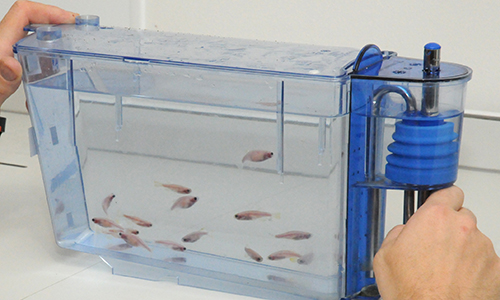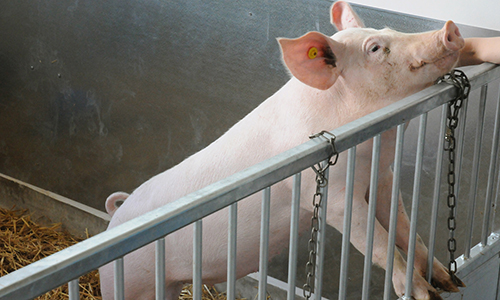How we work
The University of Bristol’s Animal Services Unit (ASU) provides facilities, services and advice for all scientists within the University who need to carry out research involving animals. The ASU is one of the University’s Professional Services, and reports to the Registrar and University Secretary and Establishment Licence Holder, Lucinda Parr.
The Animal Services Unit
The ASU are a team of dedicated animal technicians and veterinary surgeons employed to look after the laboratory animals used for regulated scientific procedures at the University. We are specialists trained in the husbandry and welfare of the different species we care for.
ASU staff purchase animals from specially-chosen commercial suppliers. We arrange for animals to be carefully transported to our animal facilities where they are settled into their new environment before studies start.
The ASU works together with researchers to ensure the welfare of animals while they are being studied. At the end of each study, the animals are usually euthanised by trained staff according to current good practice, often to provide important tissue samples required for further research.
When legally possible, animals may be re-homed as domestic companion animals following a suitability assessment by a veterinary surgeon. Across 2022, ASU were able to re-home 20 rats which had previously undergone procedures under the Animals (Scientific Procedures) Act, 1986, amended 2012.
Animals we care for and work with
The animals we house depend on the research we are carrying out. They are mostly rodents and fish. Sometimes, owners who visit our veterinary practice agree to their pets taking part in research to help improve veterinary treatments for companion animals. For more details see our Areas we study page.
Our facilities
All ASU facilities provide an environment and housing appropriate for the species being looked after. Typically animals are housed in cages or pens filled with bedding and nesting materials in addition to play items to encourage natural behaviours. Animals are usually housed in groups to allow for normal social interaction and cages are cleaned and changed frequently to maintain a healthy living environment.
Our flagship research facility is one of the University’s newest buildings and is unique in the UK and Europe. It is a large animal research hospital operating to NHS, Home Office and Good Laboratory Practice Monitoring Authority standards and including state-of-the-art equipment. It enables the validation of new biomedical devices, medical procedures and drugs before proceeding directly to first-in-man and first-in-companion-animal trials.
The support we provide
The ASU also offers legal and ethical advice to researchers via our Animal Welfare and Ethics Review Body (AWERB). AWERB helps to ethically review scientific programmes of research, promote the 3Rs, provide training to new researchers and support best practice. Our Named Veterinary Surgeon (NVS) and Named Animal Care and Welfare Officers (NACWOs) are actively engaged in monitoring the health and welfare of laboratory species at the University on a day-to-day basis. ASU staff sometimes also get involved in specific scientific procedures (such as blood sampling) to support our researchers.
AWERB meeting minutes
As part of our commitment to the Concordat of Openess, the minutes of Animal Welfare and Ethical Review Body (AWERB) meetings from 2021, 2022 and 2023 are published below:
2023
- AWERB minutes January 2023 (PDF, 162kB)
- AWERB minutes Febuary 2023 (PDF, 152kB)
- AWERB minutes March 2023 (PDF, 147kB)
- AWERB minutes April 2023 (PDF, 128kB)
2022
Summaries of Procedures Project Licenses Approved by AWERB in 2022 (PDF, 95kB)
- AWERB minutes January 2022 (PDF, 134kB)
- AWERB minutes February 2022 (PDF, 126kB)
- AWERB minutes March 2022 (PDF, 153kB)
- AWERB minutes April 2022 (PDF, 150kB)
- AWERB minutes May 2022 (PDF, 147kB)
- AWERB minutes June 2022 (PDF, 140kB)
- AWERB minutes July 2022 (PDF, 149kB)
- AWERB minutes September 2022 (PDF, 149kB)
- AWERB minutes October 2022 (PDF, 151kB)
- AWERB minutes November 2022 (PDF, 156kB)
- AWERB minutes December 2022 (PDF, 161kB)
2021
- AWERB minutes January 2021 (PDF, 185kB)
- AWERB minutes February 2021 (PDF, 140kB)
- AWERB minutes March 2021 (PDF, 148kB)
- AWERB minutes April 2021 (PDF, 157kB)
- AWERB minutes May 2021 (PDF, 150kB)
- AWERB minutes June 2021 (PDF, 141kB)
- AWERB minutes July 2021 (PDF, 130kB)
- AWERB minutes September 2021 (PDF, 139kB)
- AWERB minutes October 2021 (PDF, 135kB)
- AWERB minutes November 2021 (PDF, 145kB)
- AWERB minutes December 2021 (PDF, 156kB)


